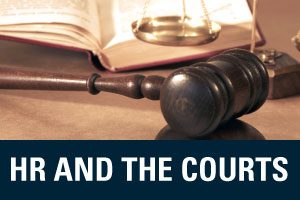by CUPA-HR | November 8, 2023
Each month, CUPA-HR General Counsel Ira Shepard provides an overview of several labor and employment law cases and regulatory actions with implications for the higher ed workplace. Here’s the latest from Ira.
California Becomes First State to Mandate Workplace Violence Prevention Plans
Under a new law, the first broad state law of its kind, most employers in California must now adopt workplace violence prevention plans by next summer. Before now, hospitals in California were the only group of employers required by state law to adopt workplace violence prevention plans. What specifically must be included in the plan is vague under the terms of the statute. The California Division of Occupational Safety and Health (Cal/OSHA) will be responsible for implementation of this statute and stated that it would adopt an appropriate workplace violence set of standards for employers.
The law will require employers to establish written plans, employee training and tracking of violent acts. Plans must be specific for each workplace and tailored to meet the individual circumstances of each setting. Commentators are looking for further guidance from Cal/OSHA on the specific details that must be covered by employer plans.
Mandatory Time Off for Reproductive Loss
California and Illinois are leading the way in the adoption of state laws mandating that employers guarantee time off following a miscarriage or other reproductive loss to ensure leave for grieving. The laws guarantee employees up to five days of paid or unpaid leave following a reproductive loss including miscarriage and still birth, as well as failed adoption, invitro or surrogacy. Utah has adopted a similar policy for state employees, and several cities have adopted similar statutes. Some national employers already voluntarily include reproductive losses in time-off provisions for employees.
NLRB Lowers the Bar to Prove Joint Employer Status — May Impact Student-Athlete Cases
The National Labor Relations Board rescinded a Trump-era regulation requiring that an alleged joint employer must have “direct and immediate” control exercised over employees to prove joint employer status. Under the new standard, if an alleged joint employer indirectly controls job terms or conditions of employment, it is a joint employer subject to NLRB jurisdiction. This will have immediate application to the ongoing dispute as to whether the NCAA and athletic conferences are joint employers of student-athletes, as they exercise control over rules that student-athletes must adhere to.
This also may affect the NLRB’s attempt to exert jurisdiction over student-athletes at public colleges and universities. While the NLRB has no jurisdiction over public entities, its general counsel is asserting jurisdiction over those student-athletes at public institutions based on the legal theory that the NCAA and/or the athletic conferences are joint employers.
Student-Athlete Unionization Issue May Affect Smaller Institutions and Athletic Programs
Two additional, separate NLRB cases are winding their way to a decision on whether student-athletes meet the definition of employee under the National Labor Relations Act and are therefore eligible to unionize. A West Coast case involves the NLRB issuing a complaint claiming that the University of Southern California, the NCAA, and the PAC-12 Conference are joint employers of student basketball and football players and have unlawfully refused to bargain with any union.
An East Coast case involves a union petition filed by the Service Employees International Union to represent Dartmouth College basketball players. Dartmouth has argued that its basketball players are not employees under the NLRA, as they do not receive sports scholarships and the basketball program does not generate money for the institution.
Commentators at Bloomberg have concluded that decisions allowing unionization of college athletes may have the most serious repercussions for smaller institutions and even small athletic programs that do not generate revenue at large institutions.
Class Actions Proliferate Related to Washington State’s Pay Transparency Law
A series of 40 or so class actions filed against major employers in Washington state — including Adidas, Home Depot and Marriott — will test the reach of the new Washington state job ad and pay transparency law. The Washington state law, like similar statutes in California, Colorado and New York, requires employers to provide pay ranges and benefits information in job ads, with the aim of improving pay equity for women and employees of color.
The Washington and California laws also provide plaintiff applicants with a private right to sue, with Washington’s statute incentivizing plaintiffs to sue. It grants plaintiffs an award of actual damages proven or $5000, whichever is greater, plus attorney fees upon proving a pay transparency violation.
Former Women’s Basketball Coach Loses Sex Discrimination Lawsuit
The former head women’s basketball coach at the University of Montana has lost the sex discrimination lawsuit she filed following her termination after a poor win-loss record and serious culture complaints made by players and parents, including players threatening to leave the university if she remained as coach. The court also granted a positive inference to the university’s stated rationale for termination under the “same actor” doctrine, where in this case the same athletic director that hired the plaintiff was the person who made the decision to fire the plaintiff (Schweyen v. Univ of Montana–Missoula (2023 BL 390525, D. Mont. 9.21-cv-00138, 10/31/23)).
The prior coach had a compiled 38-year performance of winning 75% of her games, while the plaintiff had only one winning season in the four years she served as head coach. The court rejected the plaintiff’s attempt to compare herself to a men’s basketball coach who had lost team players to transfer, citing multiple federal cases that have rejected arguments that disparate treatment between men’s and women’s sports teams creates an inference of discriminatory animus under Title VII.


